“We really do see it as a team”: Meet 5 SickKids staff supporting patients on their transplant journeys
Summary:
Get to know some of the members of SickKids’ Transplant and Regenerative Medicine Centre team providing transformative care.
The Hospital for Sick Children (SickKids) performs dozens of organ transplants every year. Even during the COVID-19 pandemic, when many surgeries and procedures were cancelled or delayed, teams at the hospital performed record numbers of transplants.
Meet five members of the team providing transformative care at SickKids.
Kalyn Bolland, Senior Clinical Manager
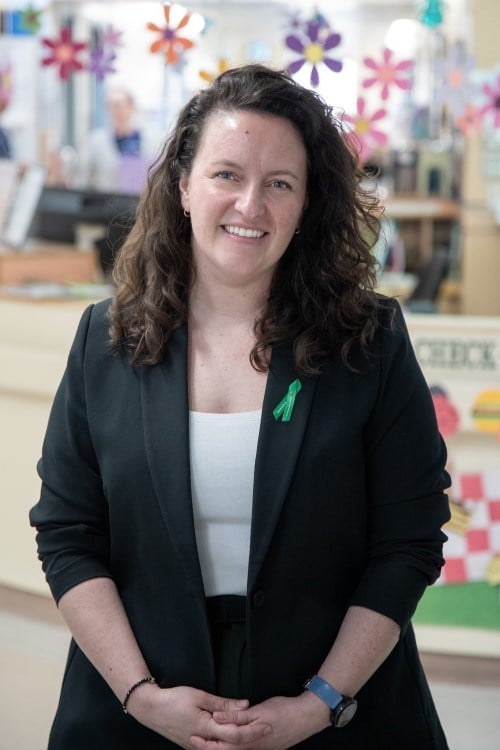
Kalyn Bolland remembers her SickKids “wow” moment clearly: as a bedside nurse she was taking care of a young patient who was in pain post-kidney transplant. She was sitting down charting and had been trying to provide comfort when one of SickKids’ therapeutic clowns came in. The clown started pretending to knock on a fake door, and eventually the child cracked a smile.
“There are not many places where you can be sitting there laughing at a clown. It was this heartwarming moment, one that I always remember,” Bolland says. “I work in a place where people want to make kids’ lives better and will try really hard to do that. I’ve taken that as inspiration throughout my career since, too.”
Bolland started at SickKids as a student and became a Nurse on the Transplant and Medical Specialties unit shortly after she graduated. She worked at the bedside and in a Clinical Support Nurse role on 6AB, the inpatient transplant unit, for 12 years before moving into her current role as one of the Senior Clinical Managers on the unit. Now, along with a colleague, she’s in charge of the unit’s day-to-day and long-term operations, as well as providing leadership to the interdisciplinary team and liaising with the medical team.
Once a patient is listed for a transplant, teams at SickKids coordinate a lot of moving pieces. Bolland notes that’s an area SickKids excels in — different teams communicating and working through the complexities that can come with some of the realities of coordinating transplants, like receiving an organ in the middle of the night or a patient not being in the province when an organ becomes available.
“We do really see it as a team — the 6AB team, but also the transplant and medical specialty teams as well,” she says. “It ties people together in a common goal and working toward something, whether that’s getting patient updates a year out from transplant or a patient stopping by.”
That was the case recently for Bolland in another memorable moment when a patient she took care of more than a decade ago at SickKids came to visit.
“To see the impact of the care we were able to provide all these years later, that is the whole team’s motivation.”
Melissa Darby, Social Worker
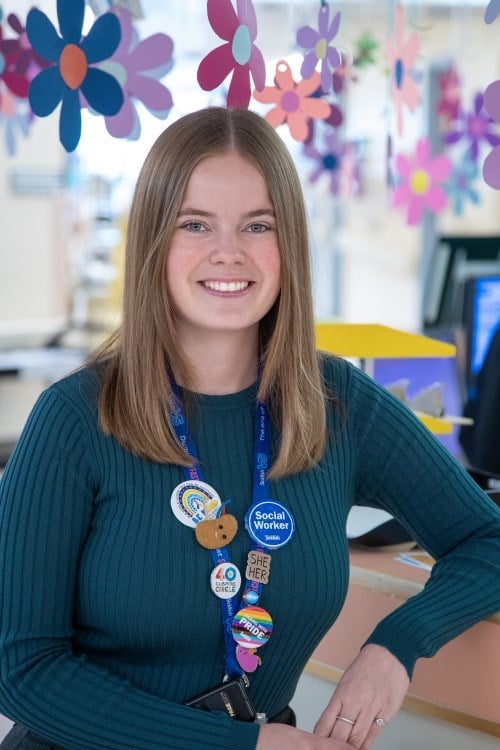
Every family’s transplant journey is different, but Social Worker Melissa Darby sees a common theme of resilience in the families she works with.
“There can a be lot of emotional turmoil in adjusting and accepting that a patient needs a transplant,” she says.
When a child needs an organ transplant, it impacts the entire family and their support systems. A lot of hard feelings can come up, including accepting this news if a patient hasn't had many symptoms or high medical needs leading up to finding out they need a transplant. The transplant journey looks different for every baby, child, adolescent or family – for some families, post-transplant means an increase in hospital appointments and medications; for patients who have been on dialysis prior to transplant, the opposite might be true. Parents may also struggle to accept that they may not be able to donate their kidney to their child if they’re not a match.
“There is an aspect of grief and loss around it,” she says. “There’s the acceptance that your kidney is not working, and that things are going to be different in your life.”
Darby works with families to promote their psychosocial well-being by incorporating their strengths to address the emotional and practical challenges that come throughout the transplant journey. One of the first steps of a transplant assessment is a social work assessment. That’s where Darby discusses the strengths and skills that patients and families are bringing and what supports might be needed at various stages of the transplant process. Then, she shares relevant information with the rest of the clinical team to ensure an individualized approach with families. Darby continues to support families throughout their transplant journey – this can include education, emotional support, advocacy or referrals to community agencies and counselling.
Darby has been at SickKids for two years, following a placement at an adult dialysis centre. Her favourite part of her job, she says, is working with and learning from patients and families. “You learn so much from them. The resilience and strength you see in these families, these children, these adolescents, and their ability to move through challenges and get to the other side, that’s the best part of it.”
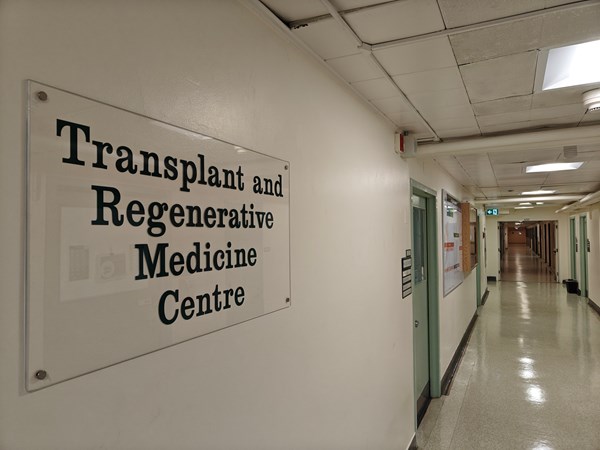
Did you know?
In 1998, SickKids established North America's first Paediatric Academic Multi-Organ Transplant Program. In 2008, this program became SickKids' Transplant & Regenerative Medicine Centre. Check out more SickKids firsts here as we celebrate the hospital’s 150th birthday!
Jane Darch, Child Life Specialist
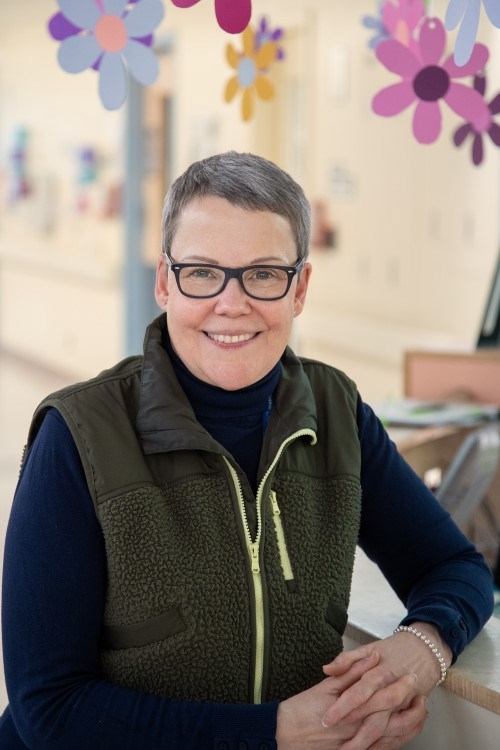
Jane Darch knew there was a job out there like the one she was looking for: one in a health-care setting that involved working with children with special needs. “I have to find it,” she remembers telling her family. Darch started her Child Life career at a hospital in the United States and then transitioned to her dream hospital, SickKids, where she’d received care as a child. “It was a full-circle moment. Coming back to the organization has been very meaningful,” she says. Jane’s first role at SickKids was working in Marnie’s Lounge. Darch has been at SickKids for 26 years. She spent 17 years working as a Child Life Specialist in the Dialysis and Apheresis Unit and Unit 6AB and recently moved to 5B, the General Surgery and Gynecology Unit.
Darch supports children and youth in finding ways to cope before and after their transplant. This often includes providing developmentally appropriate education – after learning from nurses and physicians, Darch wrote her own procedural preparation teaching book to help kids learn about the transplant journey and promote a sense of mastery in their care. She may also give kids a tour of the spaces where they’ll receive care in the hospital to support familiarization of the environment and medical equipment. Pre-transplant, she works with children on medication compliance. This can include teaching kids how to swallow pills, starting with a small piece of candy and working up to the size of the pills children will need to take. Through this process, she helps kids learn about what the medicine does in their body and answers other questions they may have, like why they need a transplant or where the donor organ is coming from.
Post-transplant, Darch facilitates medical play to positively frame the hospital experience. She also supports patients’ physiotherapy goals of care, sometimes creating reward charts to recognize their efforts, or goal-focused bingo games where the squares include goals like sitting up or walking, as well as relationship-building items like telling a nurse a fact they don’t know about themselves. “There’s some playfulness deliberately placed in the squares, to help children feel like they’re being successful with some really challenging experiences.”
Helping patients find ways to cope and giving them strategies to work through the hard parts of the process is the most rewarding part of her job, Darch says. “My hope is that the impact of the surgery is lessened, because we know when children are better prepared for procedures and treatment, they cope better in the short term and have better health outcomes longer term, because they are included in the experience.”
Dr. Aamir Jeewa, Cardiologist
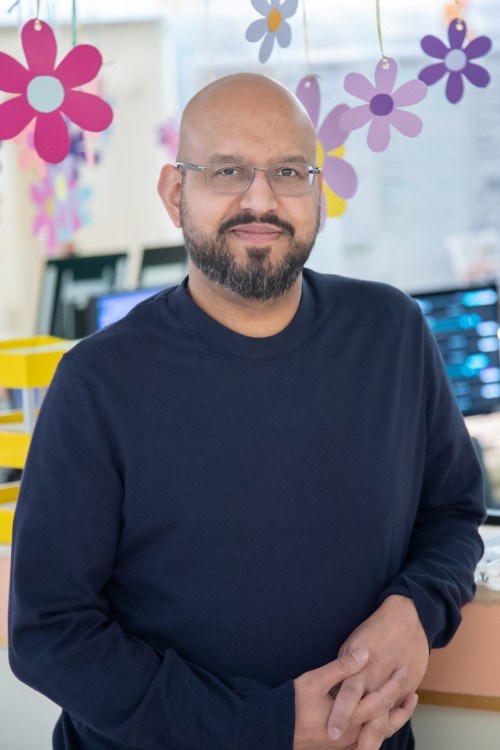
Dr. Aamir Jeewa, a basketball fan and player, likens the coordination that goes into heart transplants to a team sport. “The wow moment for me is really how the teams come together to make it happen,” he says.
At the time of his paediatric cardiology training in Vancouver, technology like ventricular assist devices (VAD), which pump the heart to rescue children out of severe heart failure or bridge a patient to heart transplant, were becoming more commonly used in children. SickKids was an early leader in using those technologies, and pioneered infant heart transplants across incompatible blood types, so Jeewa came to SickKids to complete an additional year of fellowship training in advanced heart failure and transplant.
“It dovetailed together to be the right place and the right time to train in this particular field,” he says.
After his fellowship, Jeewa worked at Texas Children’s Hospital before he returned to SickKids in 2016. Now, he’s the Section Head, Cardiomyopathy & Heart Function in the Division of Cardiology, and the Medical Director of the Ventricular Assist Device (VAD) program. When Jeewa is on service, a typical day starts with rounding on 4D, the Cardiology Unit, seeing patients who have heart failure and need VADs and patients who have had recent transplants.
After rounding, he’s part of a team that reviews consults from around the hospital, which might include patients seen by different services or in the Cardiac Critical Care Unit. He also contributes to multidisciplinary meetings about transplant and heart failure patients, attends weekly clinics when on service, and participates in research and teaching.
He often sees patients who are on a VAD, and may feel better energy-wise but are confined to the hospital, with equipment connected to their body.
“We’re seeing them at a fairly sick stage of their life, where there may be limitations to their quality of life or challenges for what they can do on a day-to-day basis,” he explains. “We navigate that with their families and try to keep them as healthy as possible until they get bridged to a transplant, while optimizing their quality of life and mental health to make sure it’s not a miserable time in hospital.”
Once a patient has been bridged to transplant, or has received a transplant, “it’s great to see their quality of life as they’re back to doing the activities they love and seeing them thrive. That’s the great part of the journey.”
Jaina Leitch, Kidney Transplant Nurse
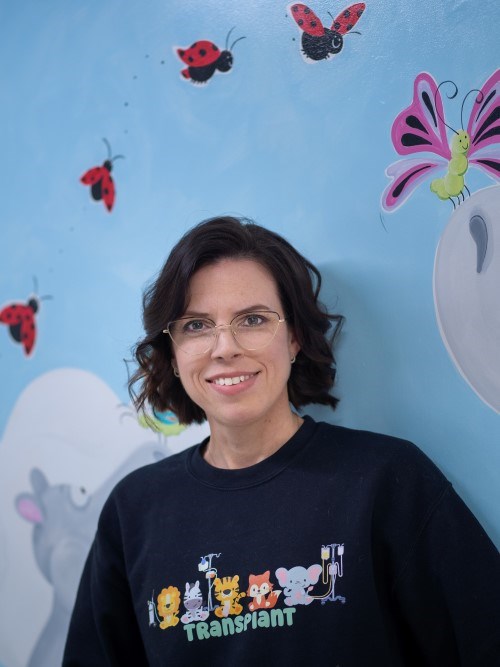
As a Transplant Nurse in SickKids’ Kidney Transplant Program, Jaina Leitch first meets children and adolescents when they are approaching end-stage kidney disease and starting to experience the effects of failing kidneys, some requiring dialysis. After their transplant, she watches as they get to be kids again. “When you see a kid running off the unit when they’re discharged after their transplant, that’s why you do what you do,” she says.
Leitch also knows what it feels like to be part of a patients’ journey in a very literal sense: when a living donor donates a kidney, she picks it up from Toronto General Hospital. She transports the kidney, in a cooler on a cart, through the underground Hospital Row tunnels to SickKids’ Operating Room. The day of the transplant can be emotional for families. Leitch gets to tell families that the kidney has arrived and the transplant is getting started. Although it’s not every day, it’s a special moment when it happens. “It means a lot to be part of that journey.”
Leitch has been part of many families’ journeys since she started at SickKids as a Clinical Extern in 2006. Now, once it’s decided a patient needs a kidney transplant, her role as a Transplant Nurse is to get them through the assessment — both by making sure the clinical team has all the information they need to proceed safely, and through ensuring the patient and their family know what to expect at each stage of the process. She meets with patients and families several times throughout their journey to talk through what to expect at various stages to help them “feel prepared and empowered, and a little less worried about what’s to come.” Leitch tailors her education approach based on each patient and family.
“There’s no set approach that’s going to meet every patient and family’s needs,” she says. Some patients, such as those who have been on dialysis, may be more familiar with being in hospital – for others who have never been to the hospital, having a major surgery and being admitted for a few weeks is an overwhelming prospect. “I try to meet people where they’re at, because I want them to really understand the information."
At follow-up appointments, she gets to hear about how patients are doing at school and what activities they can now take part in. “It just blows my mind every time,” she says. “Children are so resilient. Our team always says, ‘Transplant transforms’ and it really does.”
Leitch has spent 17 years in some form of transplant nursing, and has seen organ donation give recipients “an opportunity to live their best life.” She encourages people to go to beadonor.ca to register to become a donor.

